被动语态在一般现在时和一般过去时中的运用
被动语态

二、不能用于被动语态的及物动词或动词短语:
fit, marry, own, wish, cost, agree with, arrive at / in, succeed in, happen to, take part in, belong to
The question is easy to answer. 这问题容易回答。
That book is difficult to understand. 那本书难懂。
在这种句型结构中,动词不定式和主语的关系实际上是一种逻辑上的动宾关系,可以说是动词不定式作主语变换来的,相当于It’s easy to answer the question.和It’s difficult to understand that book.由于把动词宾语放在主语位置,所以和不定式的关系构成一种被动关系。
The door has already/just been locked.门已经/刚刚被锁上。(被动语态)
The shop is opened.这家商店开门了。(系表结构)
The shop is opened at 8 a.m. everyday.这家商店每天上午八点开门。(被动语态
That book smells old.那本书有一股霉味。
These oranges taste nice.这些橙子味道很好。 以上这些动词都不能用进行时表示。若用进行时,则表示主动含义。比较:The child is smelling the paint.小孩正在闻油漆的气味。九、在need(want, require, deserve, etc.)doing句型中,动名词(doing)相当于动词不定式的被动式(to be done),在意思上没有多大差别。例如:
一般现在时和一般过去时的被动语态
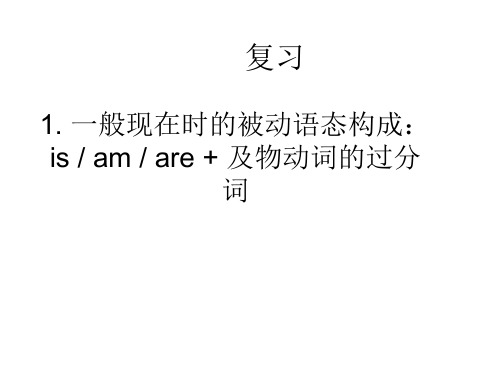
5. Last year we built a library in our
school. A library __w__a_s__ __b_u_i_lt__ in our school last year.
7. Did you plant many trees at this time last year?
__W__er_e__ __m_a_n_y_ __t_r_e_e_s_ _p_l_a_n_t_ed_ at this time last time?
9. The foreign friends gave us some wonderful stamps. 1) __w_e____ __w_e_r_e_ __g_i_v_e_n_ some wonderful stamps.
复习
1. 一般现在时的被动语态构成: is / am / are + 及物动词的过分
词
练习
They do their homework after school.
He plays basketball every week.
My mother sweeps the floor every day.
invent
Thomas Edison invented the light. The light was invented by Thomas Edison .
练习
1.They had an evening party last week.
2,The students planted many trees yesterday
2) Some wonderful stamps __w__e_re__ __g_iv_e_n___ _t_o_____ _u_s_____.
五种常用时态的被动语态
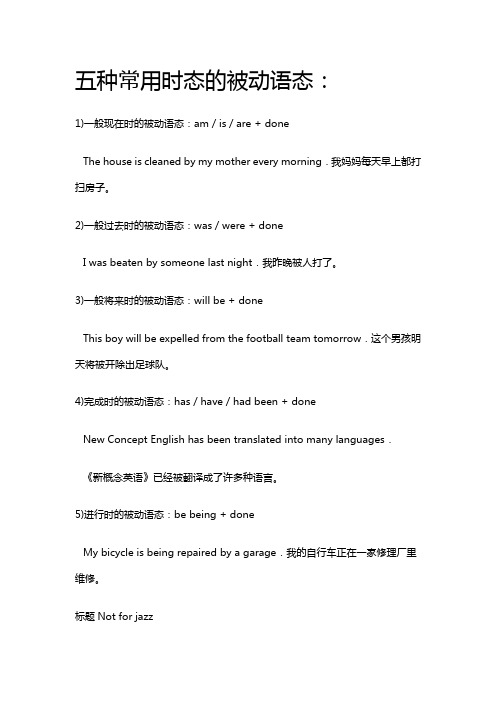
五种常用时态的被动语态:1)一般现在时的被动语态:am/is/are + doneThe house is cleaned by my mother every morning.我妈妈每天早上都打扫房子。
2)一般过去时的被动语态:was/were + doneI was beaten by someone last night.我昨晚被人打了。
3)一般将来时的被动语态:will be + doneThis boy will be expelled from the football team tomorrow.这个男孩明天将被开除出足球队。
4)完成时的被动语态:has/have/had been + doneNew Concept English has been translated into many languages.《新概念英语》已经被翻译成了许多种语言。
5)进行时的被动语态:be being + doneMy bicycle is being repaired by a garage.我的自行车正在一家修理厂里维修。
标题Not for jazz总结for的用法:1)为:I bought a book for you.我为你买了一本书。
2)因为:Something fell in,for I heard a splash.一定有东西掉下去了,因为我听见扑通一声。
4)适合:Not for jazz=It's not suitable to play jazz on the clavichord.古钢琴不适合演奏爵士乐。
Question:What happened to the clavichord?to后面加宾语,表示其身上发生了什么事,即动作的目标、对象。
What happened to you?你怎么了?(在你身上发生了什么事?)(1)否定句与疑问句的被动语态We don’t believe her.我们不信她的话。
初中英语语法——动词的被动语态

动词的被动语态【用法讲解】考试要求:中考要求掌握:动词的主动语态和被动语态区别与使用,不同时态的被动语态形式及情态动词的被动语态形式。
英语动词有两种语态:主动语态和被动语态,主动语态表示句子的主语是谓语动作的执行者;被动语态是表示句子的主语是谓语动作的承受者。
如:We often clean the blackboard.(我们是擦黑板的执行者即主动语态)The blackboard is often cleaned by us. (黑板是clean的承受者即被动语态)。
1. 被动语态的结构一般现在时:am / is / are + 及物动词的过去分词一般过去时:was / were + 及物动词的过去分词一般将来时:will / shall be + 及物动词的过去分词现在完成时:have / has been + 及物动词的过去分词现在进行时:am / is / are being + 及物动词的过去分词过去完成时:had been + 及物动词的过去分词如:You are wanted on the phone. 有你的电话。
China was liberated in 1949. 1949年中国解放。
The problem will be discussed tomorrow.明天将对这个问题进行讨论。
Not a book in the library has been taken away.图书馆里没有一本书被人拿走。
My bike is being repaired.我的自行车正在修理。
The book had been borrowed when I got to the library.我到了图书馆时,那本书已经借出去了。
2. 主动语态与被动语态的转换(1)把主动语态的宾语变为被动语态的主语。
(2)把谓语变成被动结构(be+过去分词),根据被动语态句子里主语的人称和数,以及原来主动语态句子中动词的时态来决定be的形式。
英语被动语态用法
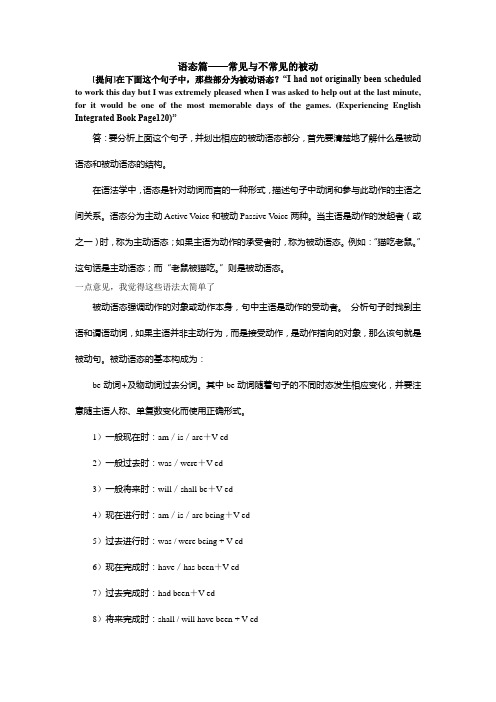
语态篇——常见与不常见的被动[提问]在下面这个句子中,那些部分为被动语态?“I had not originally been scheduled to work this day but I was extremely pleased when I was asked to help out at the last minute, for it would be one of the most memorable days of the games. (Experiencing English Integrated Book Page120)”答:要分析上面这个句子,并划出相应的被动语态部分,首先要清楚地了解什么是被动语态和被动语态的结构。
在语法学中,语态是针对动词而言的一种形式,描述句子中动词和参与此动作的主语之间关系。
语态分为主动Active V oice和被动Passive V oice两种。
当主语是动作的发起者(或之一)时,称为主动语态;如果主语为动作的承受者时,称为被动语态。
例如:“猫吃老鼠。
”这句话是主动语态;而“老鼠被猫吃。
”则是被动语态。
一点意见,我觉得这些语法太简单了被动语态强调动作的对象或动作本身,句中主语是动作的受动者。
分析句子时找到主语和谓语动词,如果主语并非主动行为,而是接受动作,是动作指向的对象,那么该句就是被动句。
被动语态的基本构成为:be动词+及物动词过去分词。
其中be动词随着句子的不同时态发生相应变化,并要注意随主语人称、单复数变化而使用正确形式。
1)一般现在时:am/is/are+V-ed2)一般过去时:was/were+V-ed3)一般将来时:will/shall be+V-ed4)现在进行时:am/is/are being+V-ed5)过去进行时:was / were being + V-ed6)现在完成时:have/has been+V-ed7)过去完成时:had been+V-ed8)将来完成时:shall / will have been + V-ed9)过去将来完成时:would / should have been + V-ed例如:1)All kinds of commodities made in China are widely used in many American families. 这句中文翻译漏了吧。
被动语态的用法

被动语态的⽤法被动语态的⽤法学习被动语态的⼏个问题被动语态是动词的⼀种特殊形式,表⽰句⼦中的主语是动作的承受者,汉语往往⽤“被”、“受”、“给”等词来表⽰被动意义。
1. 被动语态的各种时态被动语态(The Passive Voice)是动词的⼀种形式,表⽰主语是谓语动词的承受者。
被动语态便于论述客观事实,故常⽤于科技⽂章、新闻报道、书刊介绍以及景物描写。
被动语态没有将来进⾏时、过去将来进⾏时和完成进⾏时形式。
1)⼀般现在时The boy is called Johnson.2)⼀般过去时Where were you educated?3)⼀般将来时The result will not be announced until 6 o’clock.4)现在进⾏时The road is being repaired.5)过去进⾏时He was being looked after by his sister.6)现在完成时She hasn’t been told about it yet.7)过去完成时She told me that the factory had been closed down.8)将来完成时This project will have been completed by the end of this year.2. 主动语态变被动语态需要注意的⼏个问题.(1)时态保持⼀致。
The teacher punished him many times for his lateness.He has been punished many times for his lateness.(2)谓语为动词短语的被动语态不能丢掉动词短语的介词或副词。
His best friend often looks after him.被动语态He is often looked after by his best friend.(3)主动语态中若有双宾语,将其中⼀个宾语变为被动句的主语,另⼀个宾语不变。
最新被动语态在一般现在时和一般过去时中的运用讲课讲稿
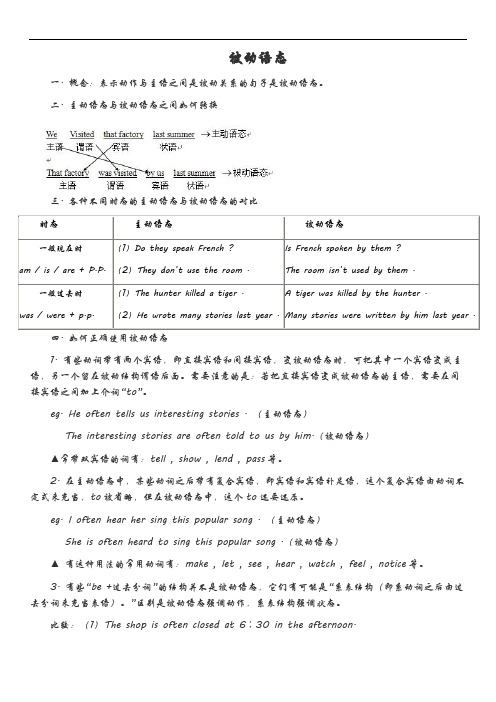
被动语态一. 概念:表示动作与主语之间是被动关系的句子是被动语态。
二. 主动语态与被动语态之间如何转换三. 各种不同时态的主动语态与被动语态的对比时态主动语态被动语态一般现在时am / is / are + P.P.(1)Do they speak French ?(2)They don’t use the room .Is French spoken by them ?The room isn’t used by them .一般过去时was / were + p.p.(1)The hunter killed a tiger .(2)He wrote many stories last year .A tiger was killed by the hunter .Many stories were written by him last year .四. 如何正确使用被动语态1. 有些动词带有两个宾语,即直接宾语和间接宾语,变被动语态时,可把其中一个宾语变成主语,另一个留在被动结构谓语后面。
需要注意的是:若把直接宾语变成被动语态的主语,需要在间接宾语之间加上介词“to”。
eg. He often tells us interesting stories . (主动语态)The interesting stories are often told to us by him.(被动语态)▲常带双宾语的词有:tell , show , lend , pass等。
2. 在主动语态中,某些动词之后带有复合宾语,即宾语和宾语补足语,这个复合宾语由动词不定式来充当,to被省略,但在被动语态中,这个to还要还原。
eg. I often hear her sing this popular song . (主动语态)She is often heard to sing this popular song .(被动语态)▲有这种用法的常用动词有:make , let , see , hear , watch , feel , notice等。
初中被动语态常考5种时态造句25个
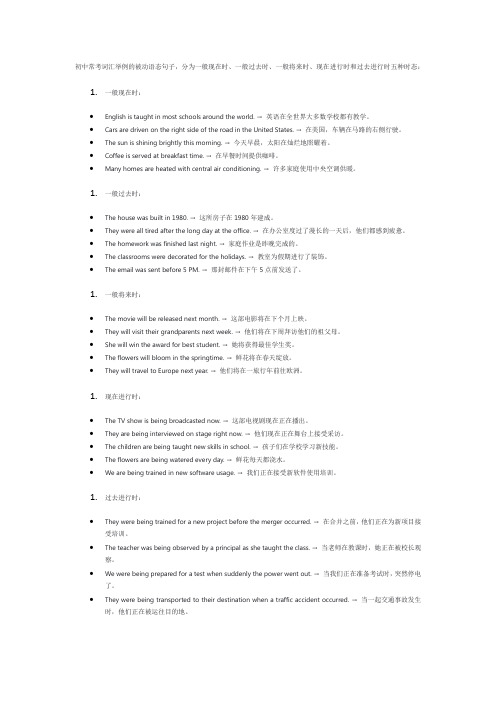
初中常考词汇举例的被动语态句子,分为一般现在时、一般过去时、一般将来时、现在进行时和过去进行时五种时态:1.一般现在时:•English is taught in most schools around the world. → 英语在全世界大多数学校都有教学。
•Cars are driven on the right side of the road in the United States. → 在美国,车辆在马路的右侧行驶。
•The sun is shining brightly this morning. → 今天早晨,太阳在灿烂地照耀着。
•Coffee is served at breakfast time. → 在早餐时间提供咖啡。
•Many homes are heated with central air conditioning. → 许多家庭使用中央空调供暖。
1.一般过去时:•The house was built in 1980. → 这所房子在1980年建成。
•They were all tired after the long day at the office. → 在办公室度过了漫长的一天后,他们都感到疲惫。
•The homework was finished last night. → 家庭作业是昨晚完成的。
•The classrooms were decorated for the holidays. → 教室为假期进行了装饰。
•The email was sent before 5 PM. → 那封邮件在下午5点前发送了。
1.一般将来时:•The movie will be released next month. → 这部电影将在下个月上映。
•They will vi sit their grandparents next week. → 他们将在下周拜访他们的祖父母。
- 1、下载文档前请自行甄别文档内容的完整性,平台不提供额外的编辑、内容补充、找答案等附加服务。
- 2、"仅部分预览"的文档,不可在线预览部分如存在完整性等问题,可反馈申请退款(可完整预览的文档不适用该条件!)。
- 3、如文档侵犯您的权益,请联系客服反馈,我们会尽快为您处理(人工客服工作时间:9:00-18:30)。
被动语态
一. 概念:表示动作与主语之间是被动关系的句子是被动语
态。
二. 主动语态与被动语态之间如何转换
三. 各种不同时态的主动语态与被动语态的对比
时态主动语态被动语态
一般现在时
am / is / are + P.P.
(1)Do they speak French ?
(2)They don’t use the room .
Is French spoken by them ?
The room isn’t used by them .
一般过去时
was / were + p.p.
(1)The hunter killed a tiger .
(2)He wrote many stories last year .
A tiger was killed by the hunter .
Many stories were written by him last year .
四. 如何正确使用被动语态
1. 有些动词带有两个宾语,即直接宾语和间接宾语,变被动语态时,可把其中一个宾语变成主
语,另一个留在被动结构谓语后面。
需要注意的是:若把直接宾语变成被动语态的主语,需要在间接宾语之间加上介词“to”。
eg. He often tells us interesting stories . (主动语态)
The interesting stories are often told to us by him.(被动语态)
▲常带双宾语的词有:tell , show , lend , pass等。
2. 在主动语态中,某些动词之后带有复合宾语,即宾语和宾语补足语,这个复合宾语由动词不
定式来充当,to被省略,但在被动语态中,这个to还要还原。
eg. I often hear her sing this popular song . (主动语态)
She is often heard to sing this popular song .(被动语态)
▲有这种用法的常用动词有:make , let , see , hear , watch , feel , notice等。
3. 有些“be +过去分词”的结构并不是被动语态,它们有可能是“系表结构(即系动词之后由过
去分词来充当表语)。
”区别是被动语态强调动作,系表结构强调状态。
比较:(1)The shop is often closed at 6∶30 in the afternoon. (带,是被动语态)。
